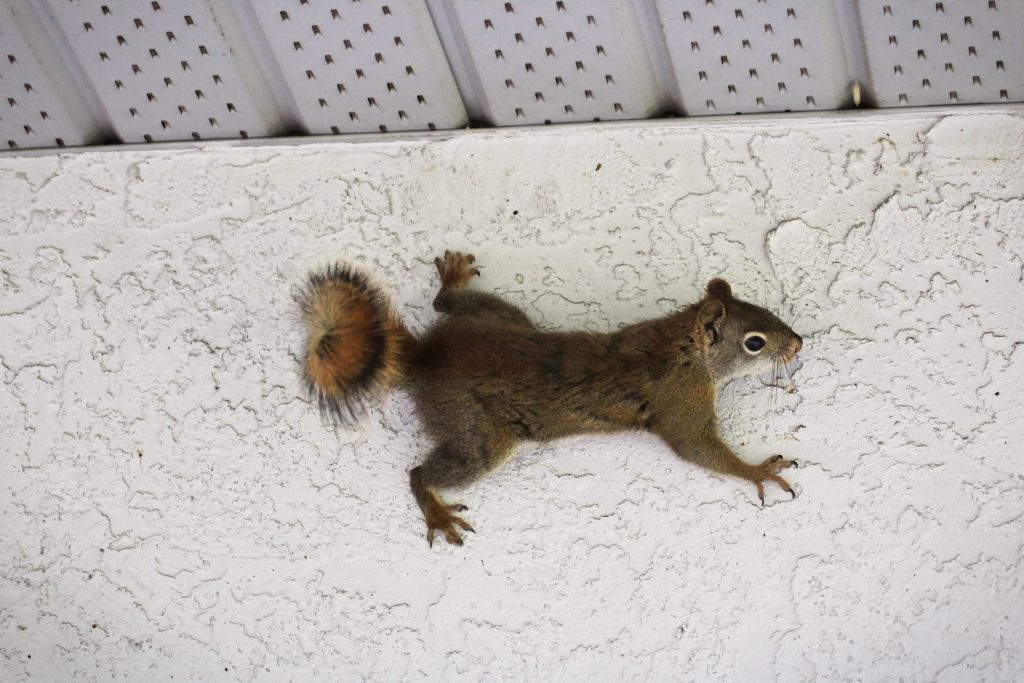“It’s just a tiny hole,” my friend said to me on a warm summer evening while we were having a barbecue in his backyard. My carefree expression immediately turned serious. While the casual observer may think otherwise, I knew that tiny holes were Heaven’s gateway for little creatures and rodents. Especially squirrels. And sure enough, a squirrel made its nest in his home over the next few days.
Squirrels are notorious for making nests in homes, especially in Toronto, Canada. If you suspect that you have a squirrel problem or found “just a tiny hole” in your house like my friend did, read on to find out how to solve this problem or call our professional squirrel removal company.
How Can Squirrels Fit Through Tiny Holes?
The general rule of thumb is if a squirrel can fit its head through a hole, it can fit the rest of its body through as well. This applies to most squirrels, as they have a tiny body that is usually smaller than their head underneath the thick layer of fur. Well-fed, plump squirrels may have an exception to this rule.
Squirrels only need the tiniest holes to fit through. In fact, they only need holes 1 ½ inches wide. They can even fit in the holes in your attic fans, vinyl soffit returns, ridge vents, and exhaust ducts. They can even chew through metal and make their own holes, causing possible damage to electrical wiring, attic structure, and roofs. Thus, it is important to make sure that even the tiniest holes are prevented and taken care of when they appear.
How Can I Prevent Squirrels From Making Holes?
Cut Trees Close to Your Home
You can cut down any trees and stray limbs close to your home. While this method can be time-consuming and costly, it can help prevent squirrels from having close access and making holes in your home.
This is not the most effective method because squirrels can climb your home through other means, such as from downspouts or wooden beams.
Use a Repellent
Most repellents such as ultrasonic repellers, chemical sprays, and mothballs are ineffective. Squirrels will find a way to circumvent these tactics, as they are intelligent and persistent creatures.
When they find a home they want to invade, they won’t give up. And unless you hire a professional, it’s likely that the solution is very short-lived.
Additionally, there are strict Canadian laws regarding the intentional harming of squirrels. Therefore, using a repellent may not work at all.
Blocking Holes
Often times, it will be already too late— a squirrel has already made a hole in your home. One method you can try is to block off the hole yourself. You can do this by using a block of wood or strong metal and securely attaching it over the hole using nails.
However, blocking off the hole yourself can cause major problems in the long run. First, if a squirrel is completely blocked off in your attic, it will eventually die and rot.
Finding the carcass can be an incredibly difficult feat, and the decaying body can spread fleas, ticks, and a host of diseases such as Lyme disease.
The second possible outcome when you block a squirrel’s hole will occur if the squirrel is outside your attic. If completely blocked off, the squirrel will simply find another way to get back in. Because squirrels are extremely persistent, unless you have a 100% squirrel-proof home, the squirrel will likely find or create a new opening into your attic.
Calling a Professional
Often times, the best method to prevent and fix holes made from squirrels is to call a professional. Professional wildlife removal companies will be able to put in place preventative measures to assist you in dealing with holes, and they will also be able to assess whether certain areas in your house are prone to squirrel infestations.
If you are worried about tiny holes in your home, your best bet is to call a professional for help. It’s always better to be safe than worry about a squirrel infestation in the long run.
